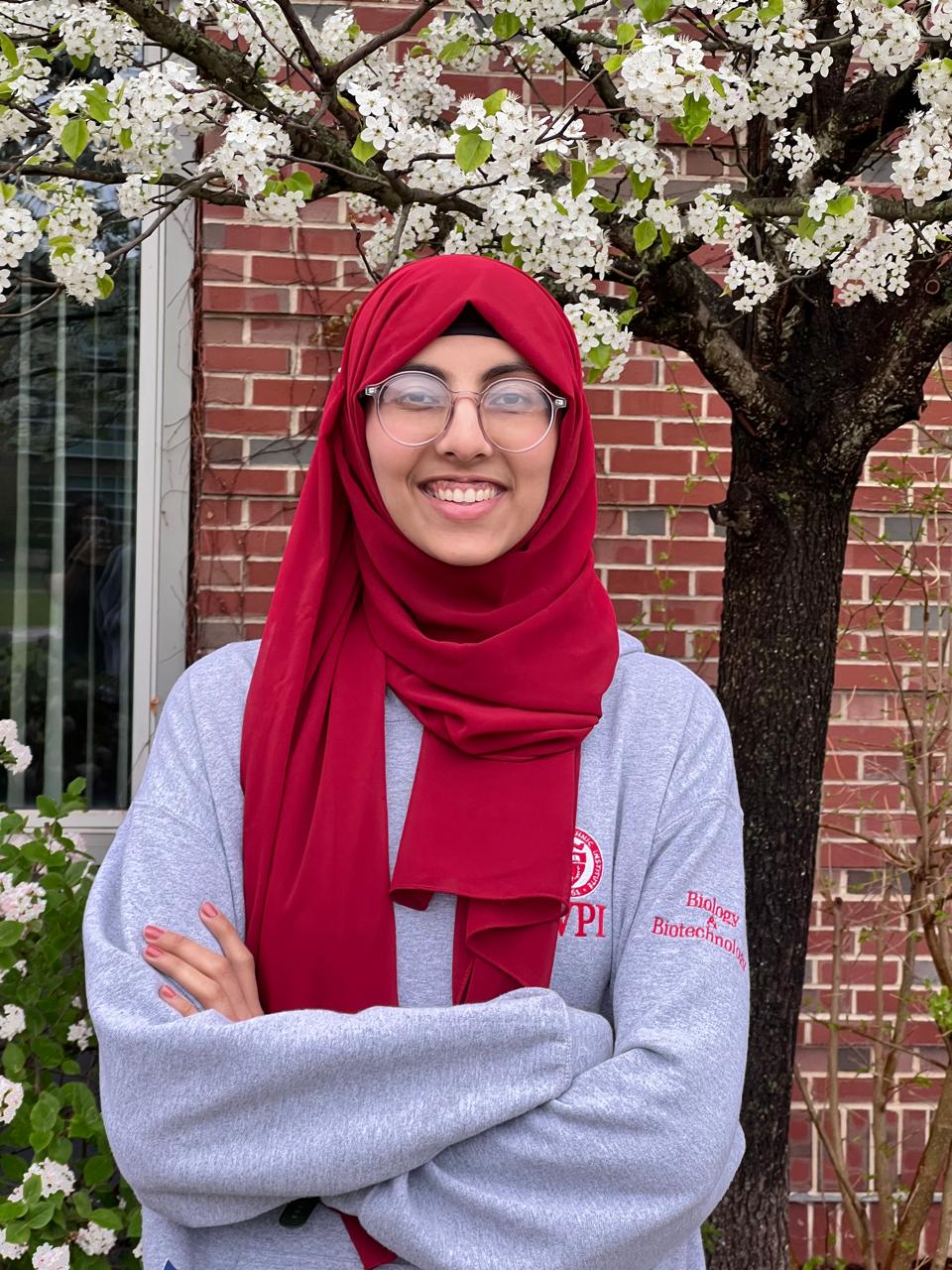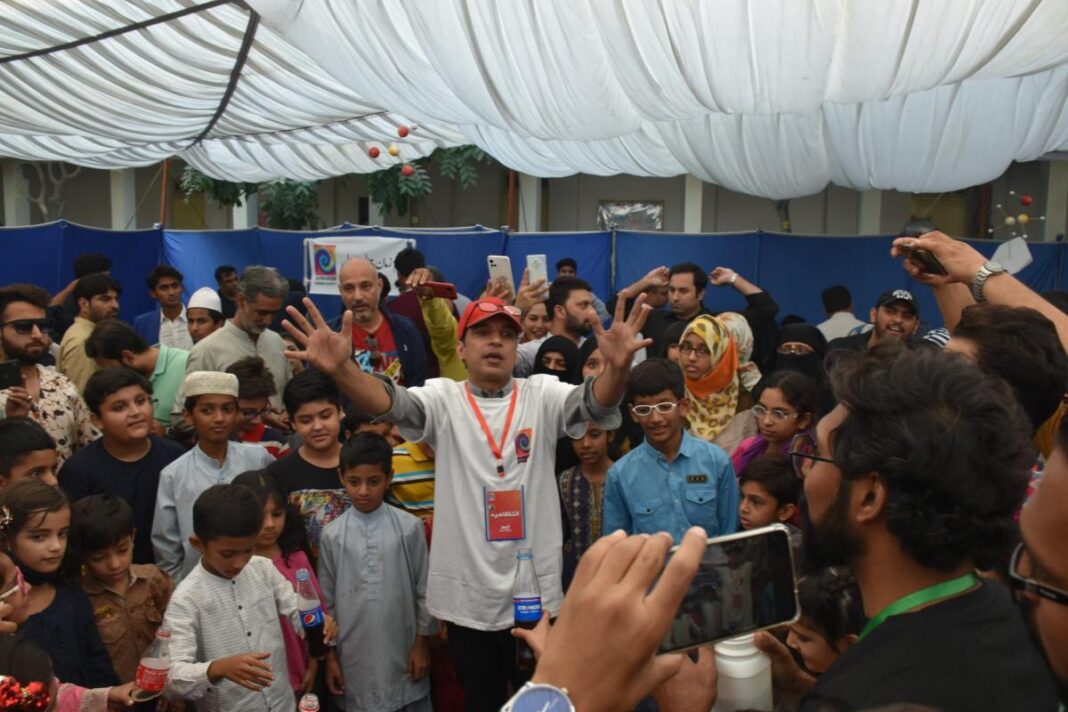Dr. Muhammad Mustafa, a renowned science communicator, professor, and cancer researcher, has represented Pakistan nationally and internationally on multiple occasions and platforms. He has empowered thousands of students both inside and outside classrooms to be more. More passionate, more empathetic, and more vocal about science.
His passion is visible as he sits surrounded by children of all ages, social backgrounds, and interests, all smiling ear-to-ear, captivated by the words and scientific spectacles they see. His experience is reflected by the multiple lectures, teacher-training sessions, and guest talks he has given in university classrooms and conferences, both locally and internationally.
However, behind all the success, memories, and moments, he is simply a man who loves science.
And so, on 25th June 2025, I sat down with him at Hairat Manzil (KSS headquarters) to ask him about his journey in science and how he knew that teaching science was his calling. We talked about pursuing one’s passion, finding scope, and how students can learn from his experience.
He smiled as he mentioned that he was never good at studying; although he enjoyed learning, he didn’t particularly enjoy reading. He had memorized most of the concepts that came along with his Matric textbooks, and although he passed his Matric exams, he didn’t quite understand the concepts well.
It was only when two juniors found him sitting outside his house and asked him to explain some concepts to them, did he discovered his passion for science and teaching and began to understand things more deeply. With a pencil and a few sheets of paper freshly purchased from their small neighborhood shop, they huddled together, and a mini-lecture started. One conversation turned into a class, then a few classes, and soon he was taking on the role of a paid tutor.

He recalls smiling that teaching became his north star. The magic of conveying information, the chaotic environment as students gathered around their teacher, and the feeling of satisfaction that came from each session was what he held on to for a long time and looked for at every stage of his life. When asked about pursuing his passion, he said, “It’s not about knowing what to pursue, it’s about knowing what not to.
There were multiple stages in my life where I could’ve moved away from teaching, but I never got the satisfaction that teaching a class of students gave me, and so I always returned. I knew what not to pursue and narrowed it down to what I wanted to pursue.”
It’s not about knowing what to pursue, it’s about knowing what not to—Dr Mustafa
With his primary studies in Chemistry and a PhD in Medical Sciences, he mentions that his interdisciplinary path was quite non-traditional, but it allowed him to see things in ways biologists or chemists individually couldn’t.
When I questioned him regarding how he made the decision and whether there was sufficient scope for these subjects at that time, he said, “Scope is not in the subjects one studies but, in the person studying them”.
For those who are unsure of what they want to pursue, Dr Mustafa says, “Your career comes later. First, you need to identify whether you resonate with the subject.”
He encourages students to sit with different fields, explore them in depth, and see how their minds react to them. He elaborates using astronomy as an example, “Watch documentaries, study stars, see how radiation is measured, study how a telescope works—spend one week with these things and see how they sit with you. Don’t let other people decide for you.”
He further elaborates on Biotechnology, “If you want to try Biotechnology or any research-related field, find a way to be in a laboratory, talk to the people who are doing the research, ask them what their research is all about and the problems they come across—sometimes these basic things are the research we need to do.”
He mentions that his job as a mentor isn’t to change someone’s academic beliefs/interests. It’s to encourage students to ask different questions that lead them to their personalized path.”

When asked for his comments for people from different fields, he mentions, “You should be good at artificial intelligence…you should know how to use artificial intelligence tools that are relevant to your field, regardless of which field and what you do.”
Hearing how he came into teaching, how that drove his fascination towards science, and how he encourages students to realize their paths made me realize one thing: No single person has the same story.
With career prospects, predicted graduate salaries, and future scope predictions, one seems to think that all of us are on a similar trajectory. However, we forget that each of us is unique, and we think differently. No two people who are eager to grow and learn both in their classrooms and in their own time will ever bring the same thing to the table. What matters is not that you do well in what is asked of you, butthat you strive to do well because your heart tells you to.
Scope is not in the subjects one studies but, in the person studying them—Dr Mustafa
When asked what he’d do if he had an unlimited amount of money, Dr Mustafa said, “I will build a university and then start teaching in it. I’ve never had any regrets about teaching. I wish I could die teaching.” He wasn’t pushed to be outstanding at what he does; he yearned to be. Nobody asked him to clock in his hours and develop a work-life balance; his work WAS an essential part of his life, and it brought him happiness.
Therefore, whatever you may choose to do, think about the career prospects, financial benefits, and future scope, but don’t leave your heart out of it. Ask yourself, would I be able to do this for free?
Despite its lows and struggles, is this bearable enough for me to push through?
If it is, jump headfirst and see what story you build for yourself.
More from the author: The STEM Whisperer: The Role of Female Tutors in Attracting More Women

Abeer Asif is a Fulbright scholar and science enthusiast currently pursuing her graduate studies at Worcester Polytechnic Institute, USA. Her hobbies include cycling, learning martial arts, and spending evenings with her tri-pawed cat, Princess. She hopes to introduce people to the wonders of biology through science communication and writing.

